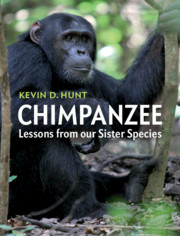Book contents
- Chimpanzee
- Reviews
- Chimpanzee
- Copyright page
- Dedication
- Contents
- Foreword
- Preface
- Acknowledgments
- 1 Sister’s Keeper
- 2 Wild Lesson
- 3 A Most Surprising Creature
- 4 Kin
- 5 Scratching Out a Living in an Unforgiving World
- 6 Guts, Glorious Guts, Large Stomach, and Colon
- 7 Thews, Sinews, and Bone
- 8 Arboreal Gathering, Terrestrial Traveling
- 9 Forged in Nature’s Cauldron
- 10 Up from the Protoape
- 11 Building a Natural Wonder
- 12 The Source of Similarity
- 13 Making Your Way in the Great Wild World
- 14 The Grim Reaper in the Forest Primeval
- 15 Powering Life
- 16 Shelter from the Storm
- 17 Meat-Seeking Missiles
- 18 The Mind of the Chimpanzee
- 19 The Brain of the Chimpanzee
- 20 Tired Nature’s Sweet Restorer
- 21 Chimpanzee Thought Transfer
- 22 Ape Implements
- 23 Wisdom of the Ages
- 24 The Daily Grind
- 25 A Nation at War with Itself
- 26 The Sporting Chimpanzee
- 27 The Passion of Pan
- 28 Into the Light
- 29 The Other Sister, Bonobos
- 30 Sister Species
- Book part
- Index
- Plate Section (PDF Only)
- References
1 - Sister’s Keeper
Humans and Chimpanzees
Published online by Cambridge University Press: 10 July 2020
- Chimpanzee
- Reviews
- Chimpanzee
- Copyright page
- Dedication
- Contents
- Foreword
- Preface
- Acknowledgments
- 1 Sister’s Keeper
- 2 Wild Lesson
- 3 A Most Surprising Creature
- 4 Kin
- 5 Scratching Out a Living in an Unforgiving World
- 6 Guts, Glorious Guts, Large Stomach, and Colon
- 7 Thews, Sinews, and Bone
- 8 Arboreal Gathering, Terrestrial Traveling
- 9 Forged in Nature’s Cauldron
- 10 Up from the Protoape
- 11 Building a Natural Wonder
- 12 The Source of Similarity
- 13 Making Your Way in the Great Wild World
- 14 The Grim Reaper in the Forest Primeval
- 15 Powering Life
- 16 Shelter from the Storm
- 17 Meat-Seeking Missiles
- 18 The Mind of the Chimpanzee
- 19 The Brain of the Chimpanzee
- 20 Tired Nature’s Sweet Restorer
- 21 Chimpanzee Thought Transfer
- 22 Ape Implements
- 23 Wisdom of the Ages
- 24 The Daily Grind
- 25 A Nation at War with Itself
- 26 The Sporting Chimpanzee
- 27 The Passion of Pan
- 28 Into the Light
- 29 The Other Sister, Bonobos
- 30 Sister Species
- Book part
- Index
- Plate Section (PDF Only)
- References
Summary
There may be only two groups of humans who truly understand how chimpanzees look at the world. The first is those who have studied chimpanzees in the wild, trailing along behind them day after day, watching as males manipulate both friends and enemies in their struggle to ascend to alpha status; or looking on in sympathy as a heavily pregnant female, tired after a long day of gathering, calculates which feeding site might pay-off best for the day’s last meal. After perhaps a year of such snooping, an observer might begin to understand what it is like to inhabit the mind of the chimpanzee, to think about the world and other chimpanzees as a chimpanzee does.
- Type
- Chapter
- Information
- ChimpanzeeLessons from our Sister Species, pp. 1 - 8Publisher: Cambridge University PressPrint publication year: 2020



